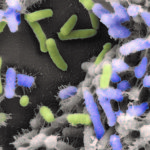Lien vers Pubmed [PMID] – 24096425
Appl. Environ. Microbiol. 2013 Dec;79(24):7770-9
Antimicrobial peptides produced by multicellular organisms as part of their innate system of defense against microorganisms are currently considered potential alternatives to conventional antibiotics in case of infection by multiresistant bacteria. However, while the mode of action of antimicrobial peptides is relatively well described, resistance mechanisms potentially induced or selected by these peptides are still poorly understood. In this work, we studied the mechanisms of action and resistance potentially induced by ApoEdpL-W, a new antimicrobial peptide derived from human apolipoprotein E. Investigation of the genetic response of Escherichia coli upon exposure to sublethal concentrations of ApoEdpL-W revealed that this antimicrobial peptide triggers activation of RcsCDB, CpxAR, and σ(E) envelope stress pathways. This genetic response is not restricted to ApoEdpL-W, since several other antimicrobial peptides, including polymyxin B, melittin, LL-37, and modified S4 dermaseptin, also activate several E. coli envelope stress pathways. Finally, we demonstrate that induction of the CpxAR two-component system directly contributes to E. coli tolerance toward ApoEdpL-W, polymyxin B, and melittin. These results therefore show that E. coli senses and responds to different antimicrobial peptides by activation of the CpxAR pathway. While this study further extends the understanding of the array of peptide-induced stress signaling systems, it also provides insight into the contribution of Cpx envelope stress pathway to E. coli tolerance to antimicrobial peptides.







